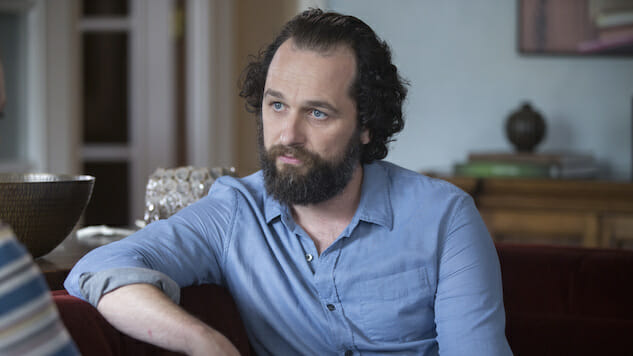Girls: “American Bitch” Is One of the Series’ Best Episodes
(Episode 6.03)
Craig Blankenhorn/HBO
[Editor’s note: This week’s episode of Girls is now streaming on HBO GO and HBO NOW. Spoilers ahead.]
The capsule episodes of Girls almost always showcase its strongest storytelling. Separated from the myriad interrelationships and sexual dramas that hustling between locations in the city brings, Girls settles and focuses on digging into its characters, who can otherwise feel like glossy caricatures, high-res GIFs repeating their expected behavior.
The series’ final bottle episode, “American Bitch”—a reference to the rumored (and ultimately rejected) working title of a Philip Roth novel—stuffs Hannah (Lena Dunham) into an elevator that leads to the complicated yet familiar story of a once-admired artist who’s had unsavory allegations leveled against him. The artist, an author named Chuck Palmer (Matthew Rhys), picks up college girls on his book tour and brings them back to his hotel room. Some, obviously unhappy with their experience blowing a famous writer after he whisked them away from campus, have begun to speak out against him, and Hannah wrote a piece on the scandal.
Palmer’s hurt. Oh, boohoo, right? It’s a testament to Dunham’s writing and Rhys’ performance that what grows over the course of episode is an exchange of stories, one that produces a considered account of sexual agency, the imbalance of power, and modern storytelling culture (including the platforms that comprise said culture). Rhys is logical and sad, simultaneously personally tepid and intellectually searing. Dunham rises to his level, delighting in the sharp, sexually-heavy badinage between them.
A complexity evolves from this empowered artist with a sad life whose accusers (to hear him tell it) are people exploiting his sexuality for the sake of a story. Or is he simply a predator using his authority to move in on perhaps-not-unwilling-at-first girls? (Of course, there’s never a question of consent in his mind.) The person on the other end of these diatribes, Hannah, has been on both sides of this scenario, having had sex used against her—in “Hard Being Easy”—and using sex for her creative experience—with Laird, in “Bad Friend,” and Jessa’s stepbrother, in “Video Games.”
The conversations are engaging and the staging is nice, with director Richard Shepard’s slow burn pacing turning Palmer’s ritzy apartment into a claustrophobic therapy session. His camera placements, even more than the conversational subject matter, corner Palmer in his own home and transform Hannah’s jaunt to the bathroom into a sweaty reprieve from a tense situation.
-

-

-

-

-

-

-

-

-

-

-

-

-

-

-

-

-

-

-

-

-

-

-

-

-

-

-

-

-

-

-

-

-

-

-

-

-

-

-

-








































